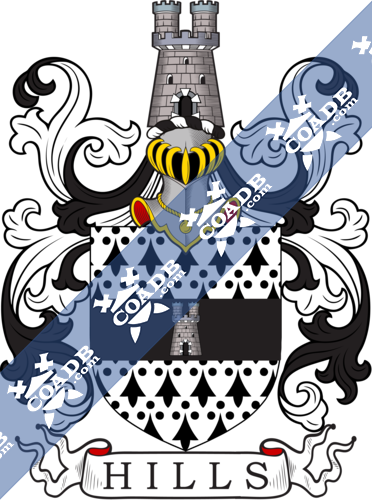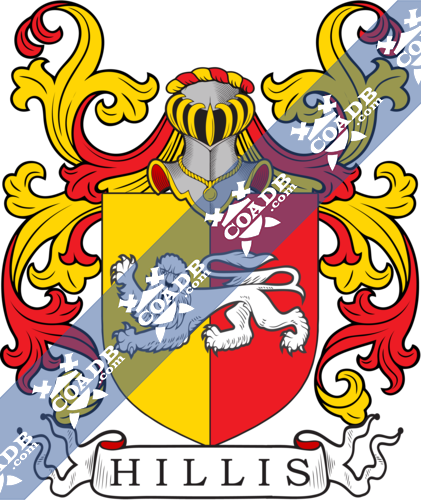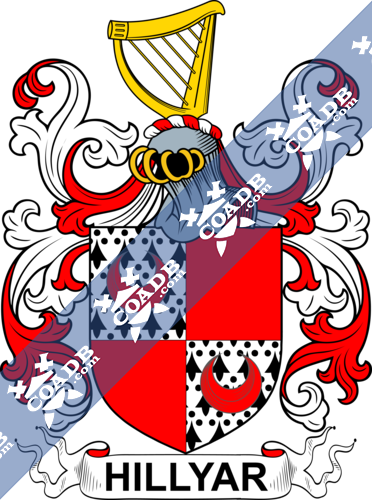Hills Family Crest, Coat of Arms and Name History

Hills Coat of Arms Gallery
Don’t know which Coat of Arms is yours?
We can do a genealogical research. Find out the exact history of your family!
Learn MoreHILLS
Hills is an English surname thought to have originated from one of two sources. The first and most likely source is geographical, indicating the bearer of the name resided on or near a hill, a word derived from the ancient English word “hyll”. The second source is patronymic, as it is believed the name Hills is a derivative of the name Hill, indicating the bearer of the name is a descendant of someone with the given or surname Hill.
The variations in the spelling of the surname Hills includes; Hill; Hils; Hille; Hilles; Hyll; and Hylls among others. The variations in spelling of surnames dating back to ancient times can be attributed to a lack of consistency regarding guidelines for spelling in use by the scribes who recorded such information, many of which were in the habit of spelling phonetically. The issue of multiple spellings of names in records was compounded by the diversity of languages in use in European countries at this time.
Until the mid to late sixteenth century, surnames were rarely if ever used. In the small settlements and villages which existed during earlier times in most of Europe, residents found little need for surnames as everyone in these communities knew each other and a given name would usually suffice. However, as communities grew and people began to migrate on a larger scale, along with the need of the government having a reliable way to track people for tax and census purposes, the aristocracy’s penchant for using surnames seemed the appropriate evolution to this problem.
In most instances to distinguish themselves, one from another, those not of the noble class would often be identified by their given name plus their occupation while others may have been identified by their given name and one of their parent’s names. There was a limitless supply from which surnames could be formed, in addition to the use of patriarchal or matriarchal names, or reference to the individuals occupation, there were things such as defining physical traits, a familiar geographical location or a topographical landmark found near the individual’s home or birthplace, the name of the village in which the person lived, and so much more. Over the course or time, surnames would come not just to represent an individual but whole families.
One of the earliest record of any variation of this surname is that of Gilbert de Hil which appears in the Norfolk tax rolls from 1191. The addition of “de” in a 12th century surname usually denoted the person was of the knightly Norman ruling class. The tax rolls, were a series of census and tax records kept by the English Treasury by order of King Richard I, with the oldest dating back over seven hundred years to the 12th century. These documents are considered the oldest concentric set of records detailing English governance in the United Kingdom spanning a period of over seven centuries.
With the discovery of America and the addition to the British Commonwealth of countries such as Canada, Australia, and New Zealand, it was not long before people began to immigrate to these outlying areas. The use of surnames made tracking of immigrants easier. One of the first recorded immigrants to America bearing the surname was Ismale Hills who landed and settled in Virginia in 1623. Daniel Hills was one of the early settlers to Canada, landing and settling in Nova Scotia in 1749. Thomas Hills was one of the early settlers to Australia, landing and settling in Adelaide in 1849. William and Caroline Hills are two of the early settlers to New Zealand, arriving and settling in Wellington in 1855.
Worldwide, the highest concentration of people with the surname Hills are found in New Zealand, the United Kingdom, Australia, Canada, and the United States. By state, the largest percentile of those with the surname Hills live in Louisiana, Maine, and New Hampshire.
There are many persons of note who bear this surname, such as Sir Richard Leslie Hills, a noted English clergyman and historian. He is the author of extensive writing on history and technology, concentrating on steam power. Educated at Queen’s College, Cambridge, Imperial College, London, and University of Manchester, Institute of Science and Technology where he earned his Ph.D., Hills is the founder of the Manchester Museum of Science and Industry. For his contributions to history and services to industrial heritage, Hills was awarded Member of the Order of the British Empire (MBE) in 2015 New Years Honors.
Blazons & Genealogy Notes
(late Astell, of Colne Parke, co. Essex). Ermine on a fesse sable a tower with two turrets proper. Crest—A tower, as in the arms.







